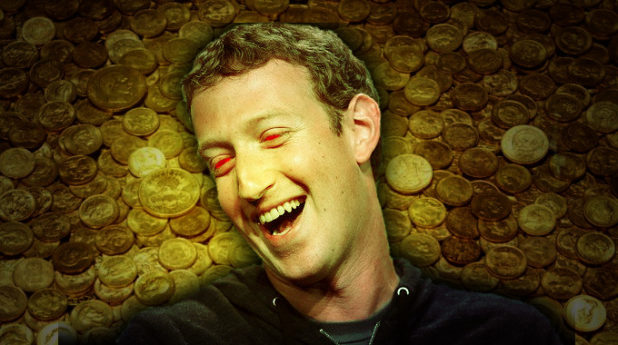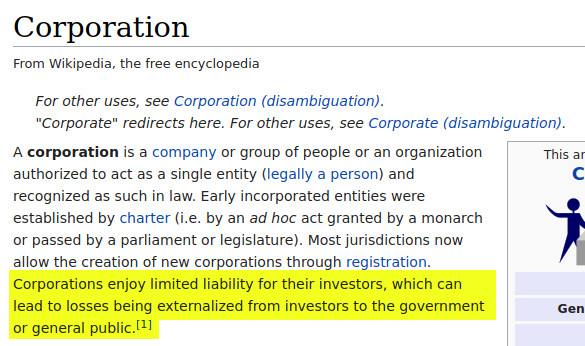Adrian Sol
Daily Stormer
September 27, 2018
“I’m just a legitimate businessman, goyim!”
One of the most common argument defending social media companies who censor their platforms, used by both cuckservatives and leftists, is that “private companies can do whatever they want with their products.”
We’ve already addressed that argument before, on its own merits. Basically, these companies operate as de-facto monopolies, and thus need to be regulated by the government. Also, social media is the modern public space, and thus needs to be protected by the First Amendment.
But there’s a more fundamental flaw in the notion that “social media giants can ban whatever they want on their platforms since they’re private companies.”
Namely, that none of these organizations are “private companies” by any definition.
They’re all public, limited liability corporations.
A private company is a business owned by a private citizen (or group of citizens). It’s his private property, and he is fully liable for it. In other words, if his company goes bankrupt, or if he gets sued into oblivion in some lawsuit, the owner can have his house and car confiscated to pay the company’s creditors.
A public corporation is completely different. These are special organizations given protection and backing by the state, and no one truly “owns” them in the conventional sense of the term. They have “shareholders,” not owners. These shareholders are not personally responsible (they have limited liability) for the actions of the corporation.
For example, if a pharmaceutical corporation were to dump AIDS-infected vaccines on the market, none of the shareholders would be sent to prison for this.
https://www.youtube.com/watch?v=wg-52mHIjhs
Not one of Bayer’s shareholders went to jail over this.
In other words, corporations like Google and Twitter are given a very high level of immunity by the government as a special privilege. In theory, corporations could be held criminally liable for doing bad stuff and dissolved, but in practice, even the most abhorrent violations will go unpunished or receive small fines as penalties.
Traditionally, this kind of privilege was granted only in exchange for the promise that the corporation would fulfill specific needs of the nation that the government was unable or unwilling to meet itself. This obligation was encoded in a “charter,” and such things had to be approved by the king, or by parliament.
A classic example of this were the East India Company and Hudson’s Bay company, corporations chartered for the purpose of colonization.
These guys aren’t Royal soldiers – they’re part of the East India Company’s corporate military force.
Of course, these days, corporations can be created easily without government permission and without having to do anything positive for the nation. And yet, they still enjoy all the incredible privileges that incorporation allow.
But these special privileges are only possible because the government grants it. In an anarcho-capitalist society without a state, there would obviously be no such thing as a “limited liability corporation.”
In other words, corporations are extensions of the state – not private businesses.
Corporations operate outside the “free market,” and are instead more like semi-privatized government organizations. They have special privileges. It’s only natural to think that they should also have special obligations – like they used to.
This used to be common sense. But decades of propaganda has erased the common man’s understanding of what a corporation is, and now most people think that these organizations are just like private businesses, and have no special obligation towards the nation.
That’s dead wrong.
None of these corporations could operate without the backing of the state – and your tax dollars.
For example, if you had a private business and started dumping toxic waste in the municipal water supply, you’d be held personally liable for that and you’d have to pay back the damages in full – even if that meant selling your private property and being saddled in debt for the rest of your life.
On the other hand, if a corporation did the same thing, it might get in a lawsuit and have to pay some fine, but not the full amount – the taxpayers would foot the rest of that bill.
You might not believe me – I know it sounds insane.
But it’s right there on Wikipedia:
There’s actually quite a lot of redpills in that article, I recommend it if you want to understand corporations a bit better.
If Google was a private company, you think their owners would accept being personally legally responsible for everything immoral the company and its subsidiaries do?
Of course not. They’d keep everything on the up and up, and operate very conservatively. They certainly wouldn’t tolerate hiring mentally ill people, who cause society enormous damage on a whim.
Just look at all the major video game companies in America. Among them, the only true “private company” is Valve, owned personally by Gabe Newell. Accordingly, the company is run much more conservatively, allows for a much greater freedom of speech than their competitors, and seems to hire far fewer (if any) insane SJWs. It’s a real business, run to make money and appeal to their customer base without jamming propaganda down their throats.
This is the reality.
Google, Facebook and Twitter are not “private enterprises.”
They’re public corporations.
Their profits are based on the state – our tax dollars.
As such, the people, represented by the state, have every right to demand these entities respect our right to free speech – or any other right whatsoever.
PS. Some have noted that there’s more to this corporate Vs. private business distinction than explained in this article. This is of course the case – I’ve created multiple businesses, both “private” and incorporated, and I’m aware of the subtleties. But in order to keep this article short and to the point, I’ve skimmed these details. For more information, you should at least read the Wiki.



